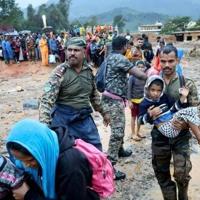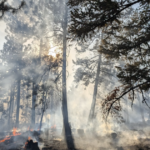Severe downpours and strong winds on Wednesday inhibited the search for survivors of landslides in Indian tea plantations which claimed the lives of 126 people, many of whom were believed to be laborers and their families.
Continuous monsoon rains have heavily impacted the southern coastal state of Kerala, with blocked roads making access to the disaster area in the Wayanad district challenging for relief efforts.
The only bridge connecting the most affected villages of Chooralmala and Mundakkai was destroyed, leading rescue teams to transport bodies using a makeshift zipline over flood waters.
Some individuals who managed to escape the initial landslides were trapped in a nearby river that had overflowed, according to volunteer rescuer Arun Dev.
The Wayanad district is famous for its tea plantations that span its hilly landscape, reliant on a large workforce for planting and harvesting.
Several plantations were hit by two successive landslides early on Tuesday morning.
A number of row houses built for seasonal workers were engulfed in mud as the landslides struck while laborers and their families were inside.
Mud and debris scattered around the disaster site, with cars and corrugated iron structures being tossed around by the force of the landslide.
An official in the Wayanad district revealed that 126 bodies had been recovered so far, with authorities expecting the death toll to rise.
Over 3,000 people sought refuge in emergency relief camps across the Wayanad district, as heavy rainfall continued in the region.
Kerala’s chief minister reported that 572 millimeters of rain fell in the two days leading up to the landslides.
More rain and strong winds were forecasted for Thursday, with potential damage to structures in other parts of the state.
– ‘Adverse weather conditions’ –
Indian opposition leader Rahul Gandhi, who previously represented Wayanad in parliament, had to cancel a planned visit to the disaster site due to the inclement weather conditions.
Monsoon rains from June to September bring relief to the region from the summer heat and are crucial for agriculture and water supply.
However, they also bring devastation in the form of floods and landslides, with climate change exacerbating the issue.
Intense monsoon storms caused flooding in Mumbai, while lightning in Bihar resulted in casualties.
Nearly 500 people lost their lives in Kerala due to flooding in 2018, marking one of the worst disasters in the state’s recent history.
The worst landslide in recent decades occurred in 1998, where heavy monsoon rains triggered rockfalls that buried the village of Malpa in the Himalayas, claiming at least 220 lives.
Events like these are likely to increase in the future due to climate change impacts, as warned by experts.
De-forestation, damming, and development projects in India have also contributed to the human toll from natural disasters.
ash/gle/cwl





